
The 1900 Summer Olympics were held as part of the 1900 World's Fair, during which many cycling events were contested. The IOC website currently affirms a total of 3 medal events, after accepting, as it appears, the recommendation of Olympic historian Bill Mallon regarding events that should be considered "Olympic". These additional events include the men's points race. Thus, three cycling events are considered Olympic events. These three competitions were held between 9 September and 16 September 1900. The cycling part of the World's Fair included 250 competitors, 160 of them French. In the sprint and 25 km events, 72 competitors, all men, from six nations competed.

The men's individual road race was a cycling event at the 2004 Summer Olympics. It was held on 14 August 2004. There were 144 competitors from 43 nations. The maximum number of cyclists per nation had been set at five since professionals were allowed in 1996. The event was won by Paolo Bettini of Italy, the nation's first victory in the men's individual road race since 1992 and fifth overall. Sérgio Paulinho's silver was Portugal's first medal in the event. Belgium earned its first medal in the men's road race since 1964 with Axel Merckx's bronze.
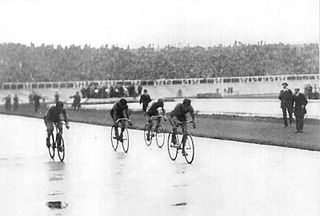
The men's 100 kilometres was one of seven track cycling events on the Cycling at the 1908 Summer Olympics programme. Its distance was the longest of the individual event distances. A challenge cup was presented by the Prince of Wales to the winner. There were 43 competitors from 11 nations. Each nation could enter up to 12 cyclists. The event was won by Charles Henry Bartlett of Great Britain, with his countryman Charles Denny finishing second. Octave Lapize earned bronze, making France the only nation to have medalists at both appearances of the 100 kilometres race.
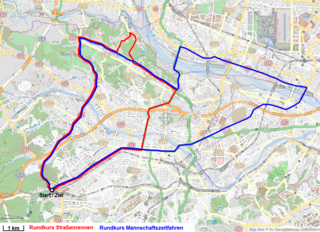
The men's individual road race was a road bicycle racing event held as part of the Cycling at the 1964 Summer Olympics programme. It was held on 22 October 1964. The course, just short of 25 kilometres, was covered 8 times for a total distance of 194.832 kilometres. 132 cyclists from 35 nations competed. The maximum number of cyclists per nation was four. The event was won by Mario Zanin of Italy, the nation's second victory in the men's individual road race and third consecutive Games in the top two. Kjell Rodian earned Denmark's first medal in the event with his silver. Walter Godefroot's bronze was Belgium's fifth medal in five Games.
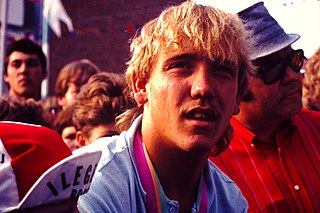
The men's points race was an event at the 1984 Summer Olympics in Los Angeles, California, for which the final was held on August 3, 1984. There were 43 participants from 25 nations. Each nation was limited to 2 cyclists. 24 cyclists competed in the final after two semifinals. The event was won by Roger Ilegems of Belgium, with Uwe Messerschmidt taking silver and José Youshimatz of Mexico bronze. It was the first medal in the event for each nation, none of which had competed in the previous edition in 1900.

The men's points race was an event at the 1988 Summer Olympics in Seoul, South Korea, for which the final was held on 24 September 1988. There were 34 participants from 34 nations, with 24 cyclists competing in the final. Each nation was limited to 1 cyclist in the event. The event was won by Dan Frost of Denmark, with Leo Peelen of the Netherlands taking silver and Marat Ganeyev of the Soviet Union bronze. It was the first medal in the men's points race for each of the three nations.

The men's points race was an event at the 1992 Summer Olympics in Barcelona, Spain. There were 38 competitors from 38 nations, with 24 cyclists competing in the final. Each nation was limited to 1 cyclist in the event. The event was won by Giovanni Lombardi of Italy, the nation's first victory in the event since 1900 and second victory overall; Italy was the first nation to have two wins in the men's points race. Léon van Bon gave the Netherlands its second consecutive silver in the event. Bronze went to Cédric Mathy of Belgium.
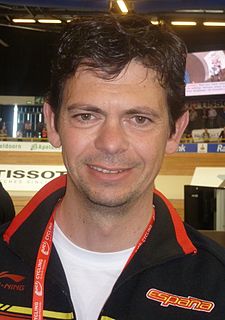
The men's points race was an event at the 2000 Summer Olympics in Sydney, Australia. There were 23 participants from 23 nations competing in the final, which was held on 20 September 2000. Each nation was limited to one cyclist in the event. The event was won by Joan Llaneras of Spain, the nation's first medal in the men's points race. Silver went to Milton Wynants of Uruguay and bronze to Aleksei Markov of Russia; those nations also earned their first medals in the event.

The men's individual road race at the 1956 Summer Olympics in Melbourne, Australia, was held on Friday 7 December 1956. There were 88 participants from 28 nations. Of the 88 starters 44 rode the distance to the end. The event was won by Ercole Baldini of Italy, the nation's first medal in the men's individual road race. Arnaud Geyre took silver, France's first medal since back-to-back golds in 1936 and 1948. Alan Jackson's bronze was Great Britain's first medal in the event since 1896.

The men's individual road race at the 1952 Summer Olympics was held on 2 August, the 2nd last day of the Olympics on an 11,2 km course running counter-clockwise from Käpylä through Pakila and Maunula and back to Käpylä. The course was circled seventeen times, so the total length of the competition was 190,4 km. About half of the road was hard-surfaced, the other half sand-surfaced. There were 154 entries from 31 nations and 111 participants from 30 nations. Each nation could enter up to four cyclists; nations entering at least three cyclists had the scores of their best three finishers summed for the team road race event. The individual event was won by André Noyelle of Belgium, the nation's first victory in the men's individual road race. His teammate Robert Grondelaers took silver. Edi Ziegler earned Germany's first medal in the event since 1896 with his bronze.
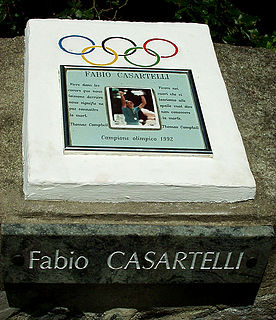
The men's individual road race]] was an event at the 1992 Summer Olympics in Barcelona, Spain. There were 154 participants from 61 nations, with 84 cyclists completing the race. The maximum number of cyclists per nation was three. The event was won by Fabio Casartelli of Italy, the nation's first victory in the men's individual road race since 1968 and fourth overall. Erik Dekker's silver was the first medal for the Netherlands in the event since 1972. Dainis Ozols gave Latvia its first medal in the event in the country's first independent appearance since 1936.

The men's individual road race at the 1976 Summer Olympics in Montreal, Quebec, Canada, was held on 26 July 1976. There were 134 cyclists from 40 nations starting the race. The maximum number of cyclists per nation was four. Fifty-eight cyclists finished the race. The event was won by Bernt Johansson of Sweden, the nation's first victory in the men's individual road race. Giuseppe Martinelli put Italy back on the podium with his silver; the nation had won gold or silver every Games from 1956 to 1968 but did not medal in 1972. Mieczysław Nowicki's bronze was Poland's first medal in the event.

The men's individual road race at the 1996 Summer Olympics in Atlanta, Georgia, was held on July 31, 1996. There were 183 participants from 57 nations in the race over 221.85 km, with 116 cyclists finishing. For the first time, the event was open to professionals. The maximum number of cyclists per nation was five, up from three in previous editions of the event. The event was won by Pascal Richard of Switzerland, the nation's first victory in the men's individual road race and first medal in the event since a bronze in 1936. Rolf Sørensen earned Denmark's third medal in the event, silver just as in 1964 and 1968. Max Sciandri similarly matched Great Britain's best result: a bronze, as in 1896 and 1956.

Silvio Martinello is a retired road bicycle and track cyclist from Italy. He won the gold medal in the men's points race at the 1996 Summer Olympics in Atlanta, Georgia, followed by the bronze medal in the men's madison in Sydney, Australia alongside Marco Villa. He was a professional rider from 1986 to 2004.

The men's sprint cycling event at the 1932 Summer Olympics took place on August 1 and 3. The format was a sprint of 1000 metres. There were nine competitors from nine nations, with each nation limited to one cyclist. The event was won by Jacobus van Egmond of the Netherlands, the nation's second victory in the men's sprint. It was the fourth consecutive Games that the Netherlands reached the podium in the event. France made the podium for the third consecutive Games, with Louis Chaillot taking silver. Bruno Pellizzari gave Italy its first men's sprint medal with his bronze.

The men's individual road race at the 1948 Summer Olympics was held on an 11.45 km course. The course was circled seventeen times, so the total length of the competition was 194.6 km. There were 141 entries from 31 nations and 101 participants from 29 nations. Of the 101 starters, 28 rode the distance to the end. The event was won by José Beyaert of France, the nation's second consecutive victory in the men's individual road race. The Netherlands and Belgium won their first medals in the event, with Gerrit Voorting's silver and Lode Wouters's bronze, respectively.

The men's track time trial in Cycling at the 1996 Summer Olympics was a time trial race in which each of the twenty cyclists attempted to set the fastest time for four laps of the track. The race was held on Wednesday, July 24, 1996 at the Stone Mountain Velodrome. There were 20 competitors from 20 nations, with each nation limited to one cyclist. The event was won by Florian Rousseau of France, the nation's first victory in the men's track trial since 1968 and fourth overall. Erin Hartwell of the United States took silver, becoming the fourth man to win multiple medals in the event. Japan won its first track time trial medal with Takanobu Jumonji's bronze.
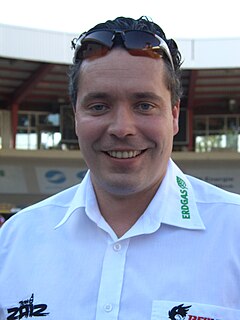
The men's sprint at the 1996 Summer Olympics (Cycling) was an event that consisted of cyclists making three laps around the track. Only the time for the last 200 metres of the 750 metres covered was counted as official time. The races were held on July 24 through July 28, 1996 at the Stone Mountain Velodrome. There were 24 competitors from 16 nations, with nations once again being allowed to have up to two cyclists each. The event was won by Jens Fiedler of Germany, the second man to successfully defend an Olympic sprint title. Curt Harnett of Canada also repeated as bronze medalist; he and Fiedler were the fifth and sixth men to win multiple medals of any color in the event. Marty Nothstein of the United States took silver, the nation's first medal in the event since 1984.

The men's individual road race at the 1960 Summer Olympics in Rome, Italy, was held on 30 August 1960. There were 142 participants from 42 nations. Each nation could enter up to four cyclists. Of the 142 starters 76 rode the distance to the end. The event was won by Viktor Kapitonov of the Soviet Union, the nation's first medal in the event. Livio Trapè of Italy took silver, putting that country on the podium for the second consecutive Games. Willy Vanden Berghen's bronze gave Belgium its fourth medal in four Games.

The men's points race, or “Course de Primes,” was a track cycling event at the 1900 Summer Olympics. The competition was held on 15 September 1900 at the Vélodrome de Vincennes. There were 13 competitors from 3 nations. The event was won by Enrico Brusoni of Italy, who won 5 of the laps including the last one. Karl Duill of Germany placed second, with Louis Trousselier of France third.



















